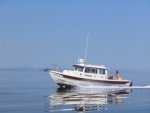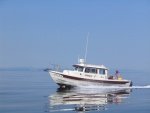ssobol
Active member
- Joined
- Oct 27, 2012
- Messages
- 3,664
- Reaction score
- 20
- C Dory Year
- 2008
- C Dory Model
- 22 Cruiser
- Vessel Name
- SoBELLE
I have a question....
Per the USCG recreational boat requirements, is it required to have a magnetic compass? With the proliferation of electronic heading display devices, is it really necessary to have a magnetic compass? On my boat I usually have at least 3 devices on board that have GPS receivers and COG displays. One of more of these might also have electronic compass components.
According to the Canadian boating regulations a magnetic compass is required for boats over 8m. A boat under 8m is not required to have a magnetic compass if it is operated "within sight of navigation marks".
I cannot find any mention of a required magnetic compass in the USCG recreational boating information on the web.
I just want to know if anyone knows if a magnetic compass is required equipment, I don't want to start along thread on whether having one or not is a good idea.
Thanks.
Per the USCG recreational boat requirements, is it required to have a magnetic compass? With the proliferation of electronic heading display devices, is it really necessary to have a magnetic compass? On my boat I usually have at least 3 devices on board that have GPS receivers and COG displays. One of more of these might also have electronic compass components.
According to the Canadian boating regulations a magnetic compass is required for boats over 8m. A boat under 8m is not required to have a magnetic compass if it is operated "within sight of navigation marks".
I cannot find any mention of a required magnetic compass in the USCG recreational boating information on the web.
I just want to know if anyone knows if a magnetic compass is required equipment, I don't want to start along thread on whether having one or not is a good idea.
Thanks.


